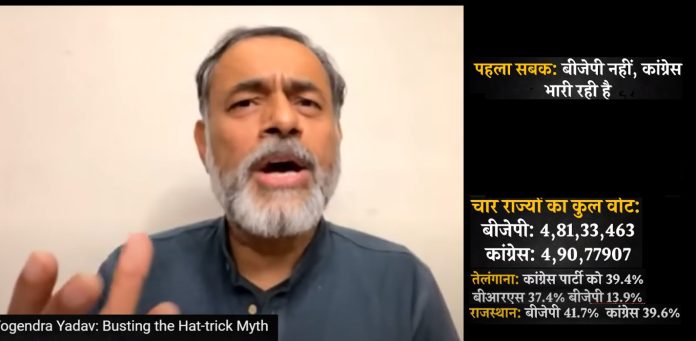– Anwarulhaq Baig
New Delhi, Dec. 7: Political activist Yogendra Yadav, founder of Swaraj Abhiyan, has debunked Prime Minister Narendra Modi’s assertion that the BJP’s ‘hat-trick’ in the assembly elections guarantees a third Lok Sabha victory in 2024.
In a video analysis, Yadav debunked the BJP’s apparent dominance, using statistics and historical trends. Dismissing it as political maneuvering, Yadav argued that the claim of a ‘hat-trick’ of victories demands closer scrutiny, not blind acceptance.
Examining Election Commission data from the recent assembly elections in four states, he highlighted intriguing disparities. Questioning the BJP’s claims of a decisive victory, he points to data showing that the Congress garnered more votes overall than the BJP, despite losing in key Hindi-speaking states.
Analyzing data from the Election Commission, Yadav reveals that the Congress received a total of 4,90,77,907 votes across the four states, exceeding the BJP’s 4,81,33,463 votes. He says that this discrepancy of 9.5 lakh votes stands in stark contrast to the popular perception of the BJP’s dominance.
Examining states separately, Yadav highlights the narrow vote margins despite BJP’s win. In Rajasthan, the difference is a mere 2%, with the BJP securing 41.7% and Congress trailing at 39.6%. Chhattisgarh and Madhya Pradesh also exhibit similar trends, with BJP leading by 4% and 8% respectively.
While the BJP secured wins in these states, Yadav argues that the Congress’s strong vote share of 40% or more provides a solid foundation for a comeback. He further emphasizes this point by highlighting the Congress’s resurgence in Telangana, where the party surged to the top despite facing near-elimination in 2018.
Yadav’s analysis challenges the simplistic narrative of a BJP landslide, urging for a closer examination beyond the headlines. He emphasizes the need to consider the nuances of vote share and regional dynamics, highlighting the Congress’s enduring political strength despite recent electoral setbacks.
Giving historical context, Yadav highlights instances where assembly election results did not predict Lok Sabha outcomes. He states that “in 2018, despite losing these Hindi-speaking states, neither the Prime Minister nor the media declared the BJP’s 2019 Lok Sabha defeat inevitable. In fact, the BJP went on to secure a landslide victory in these states and the Hindi belt.”
Similarly, he cites the example of the Congress’s 2003 defeat in these states, which did not impede its unexpected success in the 2004 Lok Sabha elections, underscoring the distinct nature of assembly and national elections.
By analyzing historical patterns, Yadav urges caution in interpreting the recent assembly results as a definitive predictor of the Lok Sabha elections. Yadav questions why the Congress cannot replicate the BJP’s feat if the BJP can do so.
Yadav points out that while the BJP relies heavily on the three Hindi belt states, the Opposition alliance INDIA’s strategy focuses on significantly reducing BJP seats in Karnataka, Maharashtra, Bihar, and West Bengal. Yadav highlights that the BJP already holds 61 out of 65 Lok Sabha seats across Madhya Pradesh, Chhattisgarh, and Rajasthan, leaving little room for further gains. On the other hand, the Congress has only three seats to lose in these states.
The five states – Madhya Pradesh, Chhattisgarh, Rajasthan, Telangana, and Mizoram – collectively hold 83 Lok Sabha seats. In the 2019 Lok Sabha elections, the BJP secured 65 of these seats, with the Congress winning only six. Giving the potential Lok Sabha seat distribution based on the recent assembly election results, Yadav analyzes that the analysis shows that the BJP could lose 19 seats, dropping from 65 to 46, while the Congress could gain 22 seats, increasing from 6 to 28.
Concluding his analysis, Yadav counters the influence of ‘Modi magic’ and argues that while some might believe this magic will guarantee a BJP sweep, such arguments lack concrete data and rely on faith rather than a realistic assessment of electoral dynamics.




